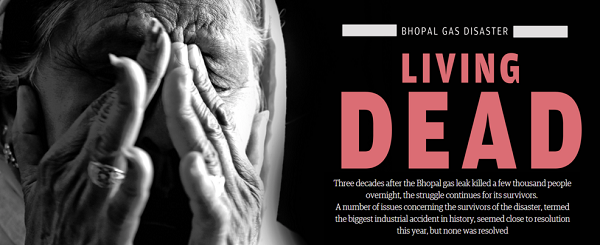
Living dead
Three decades after the Bhopal gas lead killed a few thousand people overnight, the struggle continues for its survivors. A number of issues concerning the survivors of the disaster, termed the biggest

Three decades after the Bhopal gas lead killed a few thousand people overnight, the struggle continues for its survivors. A number of issues concerning the survivors of the disaster, termed the biggest
26 years after the world's worst industrial disaster that had left over 15,000 people dead, a local court on Monday convicted all the eight accused including former Union Carbide chairman Keshub Mahindra in the Bhopal gas tragedy case.
The victims are yet to be adequately compensated or given proper medical help; their water sources are yet to be decontaminated. At Arif Nagar slum, a toxic waste yard next to the boundary wall of the factory. The accident polluted the soil and groundwater in the neighbourhood to dangerous levels.
<p>Curative Petition (Criminal) No. 39-42 of 2010 in Criminal Appeal No. 1672-75 of 1996 on Bhopal Gas Disaster.</p>
The government
Twenty-five years after Union Carbide's accursed chemical plant spewed 42 tonnes of poisonous methyl isocyanate (MIC) gas, killing 8,00010,000 people, and debilitating thousands of others, a study conducted by the Delhi-based Centre for Science and Environment (CSE) has found that toxic waste lying at the plant premises still contaminates the city's land and water.
25 years after the gas leak, another tragedy is unfolding in Bhopal reveals this study by Centre for Science & Environment. This study based on CSE's Pollution Monitoring Laboratory tests found that water and soil in & around the Union Carbide factory are loaded with pesticides. See Also: Factsheets: The legal & medical tangles. http://www.downtoearth.org.in/webexclusives/factsheet_1.htm
Massive releases of agents intentionally or unintentionally can be disruptive to the lines of individuals at many levels. In 1984, the release of toxic Methylisocyanate gas had occurred suddenly and without warning from the union carbide plant in Bhopal. This disaster had created thousands of casualties thereby overwhelming local, health and medical resources.
The most influential process safety accident passed its 20th anniversary on Dec 3, 2004. At an international symposium to mark the event in Kanpur, India during the week of this anniversary, process safety practitioners from around the world assembled to discuss progress in resolving the Bhopal tragedy and in advancing the practice of process safety worldwide.
On December 3 1984, more than 40 tons of methyl isocyanate gas leaked from a pesticide plant in Bhopal, India, immediately killing at least 3,800 people and causing significant morbidity and premature death for many thousands more. The company involved in what became the worst industrial accident in history immediately tried to dissociate itself from legal responsibility.
The 20th anniversary of the Bhopal calamity fell on December 3, 2004. The world